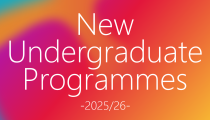
Sept 2025 Entry
1.5 years (Full-time)
3 years (Part-time)
31
This programme is offered within the Postgraduate Scheme in Health Technology.
We have a limited quota for admissions. Early applications are strongly encouraged.
What's New
Programme Aims
This award is offered within the Postgraduate Scheme in Health Technology, which aims to provide professionals in Medical Imaging, Radiotherapy, Medical Laboratory Science, Health Technology, as well as others interested in health technology, with an opportunity to develop advanced levels of knowledge and skills.
A. Advancement in Knowledge and Skill
-
To develop specialists in their respective professional disciplines to enhance their career paths;
-
To broaden students' exposure to health science and technology to enable them to cope with the ever-changing demands of work; and
-
To provide a laboratory environment for testing problems encountered at work.
Students develop intellectually, professionally and personally while advancing their knowledge and skills in Medical Laboratory Science. The specific aims of this award are:
-
To broaden and deepen students' knowledge and expertise in Medical Laboratory Science;
-
To introduce students to advances in selected areas of diagnostic laboratory techniques;
-
To develop in students an integrative and collaborative team approach to the investigation of common diseases;
-
To foster an understanding of the management concepts that are relevant to clinical laboratories; and
-
To develop students' skills in communication, critical analysis and problem solving.
B. Professional Development
-
To develop students' ability in critical analysis and evaluation in their professional practices;
-
To cultivate within healthcare professionals the qualities and attributes that are expected of them;
-
To acquire a higher level of awareness and reflection within the profession and the healthcare industry to improve the quality of healthcare services; and
-
To develop students' ability to assume a managerial or scientific level of practice.
C. Evidence-based Practice
-
To equip students with the necessary research skills to enable them to perform evidence-based practice in the delivery of healthcare service.
D. Personal Development
-
To provide channels for practising professionals to continuously develop themselves while at work; and
-
To allow graduates to develop themselves further after graduation.
Characteristics
Our laboratories are well-equipped to support students in their studies, research and dissertations. Our specialised equipment includes a flow cytometer, cell culture facilities; basic and advanced instruments for molecular biology research (including thermal cyclers, DNA sequencers, real-time PCR systems and an automatic mutation detection system), microplate systems for ELISA work, HPLC, FPLC, LCMSMS, ICPMS, tissue processors, automatic cell analysers, a preparative ultracentrifuge, automated Access Immuno-analyzer and Roche I400 automated analyzer.
This programme is accredited by the Institute of Biomedical Science (UK), and graduates are eligible to apply for Membership of the Institute.
Programme Structure
The Postgraduate Scheme in Health Technology consists of the following awards:
- MSc in Medical Imaging and Radiation Science (MScMIRS)
- MSc in Medical Laboratory Science (MScMLS)
- MSc in Medical Physics (MScMP)
To be eligible for the MSc in Medical Laboratory Science (MScMLS), students are required to complete 31 credits:
- 2 Compulsory Subjects (6 credits)
- Dissertation (9 credits)
- 3 Core Subjects (9 credits)
- 2 Elective Subjects (6 credits)
- 1 Academic Integrity and Ethics Subject (1 credit)
Apart from the award of MScMLS, students can choose to graduate with the following specialism:
- MSc in Medical Laboratory Science (Molecular Diagnostics)
To be eligible for the specialism, students should complete 2 Compulsory Subjects (6 credits), a Dissertation (9 credits) related to the specialism, 4 Specialty Subjects (12 credits) and 1 Elective Subject (3 credits), plus an Academic Integrity and Ethics Subject (1 credit).
Core Areas of Study
Compulsory Subjects
- Integrated Medical Laboratory Science
- Research Methods & Biostatistics
Core Subjects
- Advanced Topics in Health Technology
- Clinical Chemistry
- Epidemiology
- Haematology & Transfusion Science
- Histopathology & Cytology
- Immunology
- Medical Microbiology
- Clinical Applications of Molecular Diagnostics in Healthcare *
- Molecular Technology in the Clinical Laboratory *
- Workshops on Advanced Molecular Diagnostic Technology *
Elective Subjects
- Bioinformatics in Health Sciences *
- Professional Development in Infection Control Practice
- Radiation Protection and Radiation Safety
* Specialty Subject
Having selected the requisite number of subjects from the Core Subject list, students can choose the remaining Core Subjects or other subjects available in this Scheme as Elective Subjects.
The four awards within the Scheme share a similar programme structure, students may take subjects across disciplines. For subjects offered within the Scheme by the other disciplines of study, please refer to the information on the MSc in Medical Data Science/MSc in Medical Imaging and Radiation Science/MSc in Medical Physics.
31
Programme Leader
Dr Chien-Ling Huang
PhD, MSc (Research), BSc (MLS)
Deputy Programme Leader
Mr WONG Wui Wing, Harry
MSc, MRes, BSc
-
A Bachelor's degree in Biomedical Science, Medical Laboratory Science, or a related health sciences or applied sciences discipline from PolyU or a recognised institution. Other qualifications may be considered on an individual basis;
-
Relevant post-qualification work experience in medical laboratory science is preferred.
If you are not a native speaker of English, and your Bachelor's degree or equivalent qualification is awarded by institutions where the medium of instruction is not English, you are expected to fulfil the University’s minimum English language requirement for admission purpose. Please refer to the "Admission Requirements" section for details.
For further programme information, please contact:
The General Office (tel: (852) 3400 8578; email: hti.tpg@polyu.edu.hk)
or visit our website at https://www.polyu.edu.hk/hti/study/programmes/taught-postgraduate-programmes_list/
Suitable candidates may be invited to attend interviews.
For local students
6 (Full-time)
3 (Part-time)
For non-local students
6 (Full-time)/ (Part-time)
Please click here to download.
HK$6,300 per credit for local and non-local students
HTI Entry Scholarships for Taught Postgraduate Programmes are available. Please visit here for details.
PolyU reserves the right to change or withdraw the scholarship at any time. In case of any dispute/disagreement, PolyU’s decision is final.
Required






